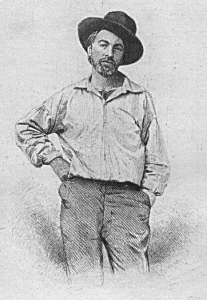
Whitman deliberately chose to depict himself as a swaggering vagabond for the first edition of ‘Leaves of Grass’. Abandoning the traditional “head and shoulders” portrait of the intellectual, here – for the first time – was a Poet of the people, and for the people.
In the middle of the 19th century, the barely-united states of America was in grave trouble. Stymied by its inability to reconcile a mandate for economic growth that depended largely on that “peculiar institution” of slavery, the so-called “Land of the Free” was increasingly divided and lurching ever closer towards conflict. America’s most highly esteemed man of letters – Ralph Waldo Emerson – proposed a bold solution. In his 1845 essay “The Poet”, Emerson described the urgent need for a poetic voice that could liberate the troubled young nation. “The poet is representative,” wrote Emerson. “He stands among partial men for the complete man, and apprises us not of his wealth, but of the commonwealth … I look in vain for the poet whom I describe.” Meanwhile, in New York City, a self-educated reporter whose feisty diatribes had earned him the sack from no less than six newspapers over four years, read with interest this essay of Emerson’s as if it were a help-wanted ad. And as the collective psyche of the nation sank deeper beneath the hypocrisy of its own Constitution, the young writer resolved to heed Emerson’s call – to force America to confront itself, and set the nation on a new and noble course. And so began an extraordinary journey. Today we celebrate America’s first and greatest national poet: Walt Whitman.
Whitman would devote the rest of his life to composing, expanding and editing his great gift to his country, Leaves of Grass. He’d served his apprenticeship on the crowded and colourful streets of Manhattan and New Orleans, obsessively recording in his numerous notebooks everyday observations of everyday people. In this vast new nation of immigrants, with its vast and seemingly irreconcilable divides, the national poet could not speak for one. He must, Whitman concluded, speak for all. He must be the Everyman:
I am the poet of the body
And I am the poet of the soul
I go with the slaves of the earth equally with the masters
And I will stand between
the masters and the slaves,
Entering into both
so that both shall understand
me alike.
From carpenters to presidents, from sea to shining sea, Whitman sang a love song of and for all America. First published in 1855 at the poet’s own expense, Leaves of Grass was met with scathing criticism. Of the 795 printed copies, only two dozen sold. But when Emerson himself proffered praise and encouragement, Whitman reprinted a much-expanded second edition and would do so again four years later. Both the 1856 and 1860 revised and expanded editions of Leaves of Grass can be read as appeals to prevent civil war. Its failure to do so plunged Whitman into depression, and at the war’s onset he despondently abandoned his great labour of love.
In December 1862, eighteen months after the American Civil War began, Whitman ventured South upon learning that his brother had been wounded in battle. The horrors of war – the endless heaps of amputated limbs – would profoundly affect him, and he relocated to Washington D.C. to volunteer in the capital’s many army hospitals. For the next three years, companionship, tobacco and candy, and often the final words of comfort for hundreds and hundreds of dying soldiers, were provided by Walt Whitman. The bloody four-year conflict finally ended in April 1865, but not before claiming its last victim a mere week after the Confederacy’s surrender – President Abraham Lincoln. As the nation grieved for its slain redeemer, Walt Whitman resumed his poetic duty. In his ode to Lincoln – “O Captain! My Captain!” – as well as Drum-Taps and the 1866 edition of Leaves, Whitman aspired to single-handedly absorb the nation’s pain. This must stand as one of the most extraordinary and altruistic poetic sacrifices.
Spanning thirty-five years from its first edition of just twelve poems through to its ninth and final 400-page edition of some 300 poems, Leaves of Grass is a Homeric tale of a momentous era in America’s history as the nation sought and struggled to define and redefine itself. In an extraordinary twist, Whitman casts his narrative voice far into the future, to tell us of his present as if it were the past. I heard his call from the womb. While she was pregnant with me, my beloved mother read and re-read Leaves of Grass; when I emerged into this world, I did so in Huntington, New York – just a stone’s throw from Whitman’s own birthplace. He has verily and always informed my conviction that Poet is Priest; there is none more noble or sacred than our poets, and Walt Whitman was one of our noblest. And so on the anniversary of his passing, let us sound a collective barbaric yawp over the roofs of the world to America’s finest, Uncle Walt!


2 Responses to 26th March 1892 – the Death of Walt Whitman